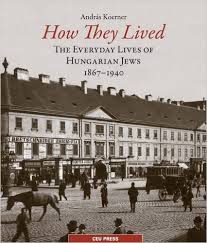Book Launch. Andras Koerner: How They Lived. The Everyday Lives of Hungarian Jews 1867-1940.
CEU Press
Book Launch
Book
presented by Prof. Victor Karády.
V. Karády:
·
„over-urbanization”
of Jews
·
only
Warsaw exceeded Budapest in terms of Jewish population and proportion of Jews
in the population
·
between
1/5 and ¼ of Hungary’s Jews lived in Budapest already since the 1870s
·
->
Koerner intervened: However, at the same time Hungary’s Jewry was
geographically very dispersed (jól lefedték az orzságot): every 5th
village had Jewish inhabitants
·
a
névmagyarosítók 60%-a zsidó volt
·
Koerner:
a kiegyensúlyozottság célja volt, megelégelte, hogy a magyar zs történelemről
szóló könyvek “downplay” az orthodoxok és a hazsidok jeelntőségét, akik pedig a
magyar zs felét alkották (1920 előtt)
·
Geiza
Moskovits –földbirtokos volt a Felvidéken. Apja Kossuth Lajos orvosa, nemesi
címre is szert tett.-> Geiza was already born into wealth and nobility. Didn’t
modernize his lands. His case was one of assimilation to the worst kind of
feudalism without modernization. (Supposedly even the right to the first night
was observed in his estate.)Even became member of the National Casino which
virtually excluded Jews.
·
mutual
assimilation – a Hungarian specificity.
o
Jews
strongly influenced non-Jewish society – at least in urban settings
o
Jews
were among the first to support modern art
o
pioneers
in new arts and new phenomena: film, photography, humour, psycho-analysis: both
analysts and clients
·
early
Hung. photography: hardly anyone took photos of Jewish subjects, because half
of the Hung. photographers were Jewish and they avoided Jewish topics “like the
plague”
·
the
2 main photographers of Jewish life in Hung. before WWII were not Hungarians:
Roman Vishniac (from Russia) and Abraham Pisarek (from Poland)
·
Karády:
all the managers taking care of Bartók’s international success were Jewish
·
Andras
Koerner: he was born in 1940 (!), he has memories from the ghetto of Pest
·
he
published personal essays in the Hungarian Quarterly
·
for
the book’s purposes he defined the “Who is a Jew?” issue in a broad sense, for
the sake of inclusiveness –f. i. although Miklós Radnóti emphasized that he did
not regard himself Jewish, it is still relevant that all his contemporaries regarded
him as a Jew, Jews, and non-Jews, regardless of being Anti-Semites or not
·
Karády:
assimilation is a reversible process
·
Koerner:
Jews highly represented in all book-related professions, including the very
simple ones: compositor in printing houses….
· in “Trianon-Hungary” only 1/3 of Jewry was Orthodox, because many Orthodox Jews lived in the territories that had been lost for Hungary in 1920
I
asked whether Geiza Moskovits got baptized and why did he not Hungarianize his
name if he was SO assimilated -> schizophrenic assimilation, or just didn’t
bother to. However, Lesznai Anna is his daughter, so she did take a Hungarian
last name.


Megjegyzések
Megjegyzés küldése